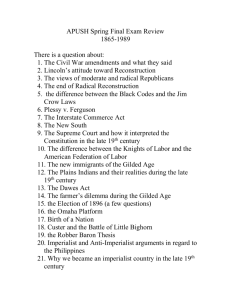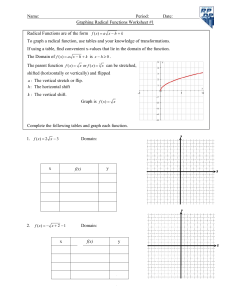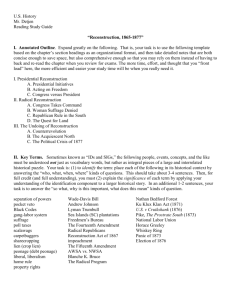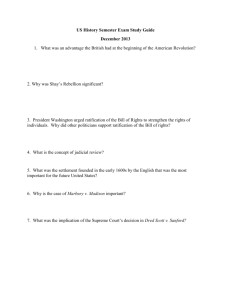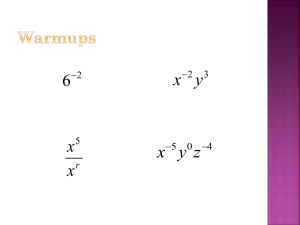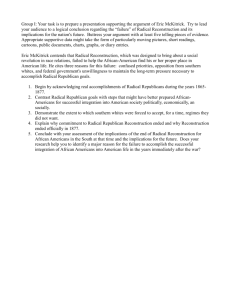APUSH SPRING FINAL REVIEW
advertisement
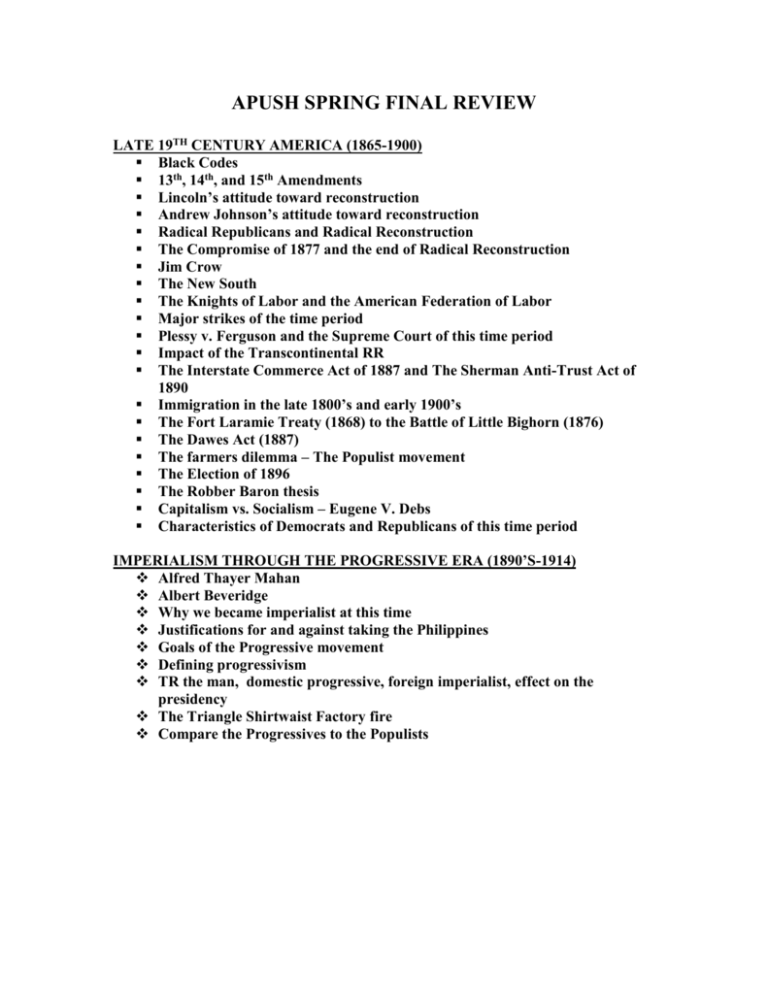
APUSH SPRING FINAL REVIEW LATE 19TH CENTURY AMERICA (1865-1900) Black Codes 13th, 14th, and 15th Amendments Lincoln’s attitude toward reconstruction Andrew Johnson’s attitude toward reconstruction Radical Republicans and Radical Reconstruction The Compromise of 1877 and the end of Radical Reconstruction Jim Crow The New South The Knights of Labor and the American Federation of Labor Major strikes of the time period Plessy v. Ferguson and the Supreme Court of this time period Impact of the Transcontinental RR The Interstate Commerce Act of 1887 and The Sherman Anti-Trust Act of 1890 Immigration in the late 1800’s and early 1900’s The Fort Laramie Treaty (1868) to the Battle of Little Bighorn (1876) The Dawes Act (1887) The farmers dilemma – The Populist movement The Election of 1896 The Robber Baron thesis Capitalism vs. Socialism – Eugene V. Debs Characteristics of Democrats and Republicans of this time period IMPERIALISM THROUGH THE PROGRESSIVE ERA (1890’S-1914) Alfred Thayer Mahan Albert Beveridge Why we became imperialist at this time Justifications for and against taking the Philippines Goals of the Progressive movement Defining progressivism TR the man, domestic progressive, foreign imperialist, effect on the presidency The Triangle Shirtwaist Factory fire Compare the Progressives to the Populists THE WORLD WAR I ERA (1914-1919) American public opinion at the beginning of the Great War The Lustiania, The Sussex Pledge, The Zimmerman Note Wilsonian Idealism The 14 Points WWI – The Homefront – propaganda, targeting radicals, taking away civil liberties, The Red Scare The Great Migration and The Red Summer of 1919 The fight over the ratification of the Treaty of Versailles THE 20’S o The stereotypical 20’s – The Roaring 20’s – Iconic figures (Linbergh, Babe Ruth, Rudolph Valentino, etc…) o The underbelly of the 20’s – KKK, Nativism, Immigration restrictions, Scopes Trial o Conservative politics in the 20’s – Harding and Coolidge THE GREAT DEPRESSION, FDR AND THE NEW DEAL, WWII (1929-1945) Hoover’s response to the Depression The Bonus Army The causes of the Depression FDR and the first hundred days Goals of the New Deal Liberal and Conservative critiques Legacy of the New Deal Dorothea Lange The CCC, TVA, AAA The Social Security Act (1935) Court Packing and it’s effect Lend Lease Cash and Carry Basic facts about the military history of WWII The Big Three Conferences – Teheran (1943), Yalta (1945), Potsdam (1945) Traditional and Revisionist views on Hiroshima and Nagasaki THE COLD WAR, THE 50’S, CIVIL RIGHTS, THE KENNEDY PRESIDENCY (1945-1963) The Truman Doctrine (1947) Truman presidency domestic affairs The Atomic Café – the impact of the nuclear age on American society Why U.S. involvement in Korea Stereotypical 50’s Origins of U.S. involvement in Vietnam Brown v. Board (1954) Rosa Parks, Emmett Till, MLK, Montgomery, Little Rock, Sit-Ins, SNCC, Freedom Rides, March of Washington, Civil Rights Acts of 1957 and 1964, Voting Rights Act of 1965, Malcolm X, Black Panthers Bay of Pigs and the Cuban Missile Crisis THE RADICAL SIXTIES, FORD-CARTER-REAGAN (1963-1989) The Radical Sixties (1963-1974) Gulf of Tonkin incident and resolution LBJ and the Great Society The Vietnam War – LBJ’s reasoning Major events of 1968 Nixon and Vietnam – Vietnamization, escalation in Cambodia, Kent State, Peace talks Nixon foreign policy – China and Détente Watergate Jimmy Carter – domestic troubles and the Iranian Hostage crisis Ronald Reagan – what he stood for politically, 1st inaugural address, Major events of his presidency THE TEST ENDS WITH FIVE PRESIDENTS OF THE 2OTH CENTURY. YOU MATCH THEM TO THE YEARS THEY SERVED. GOOD LUCK! CONTACT ME IF YOU NEED ME!
